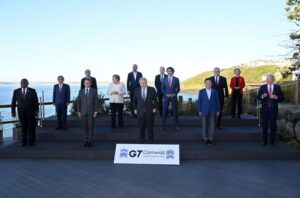Canada will donate 13 million Covid-19 vaccine doses to developing countries
 TORONTO – The joint effort of the G7 countries will be aimed at ending the Covid-19 pandemic in 2022. This was reiterated today in the final communiqué of the summit in Cornwall. “The Covid-19 pandemic – reads the final message of G7 leaders – will not be under control anywhere until it is everywhere. In an interconnected world, global health and threats to health security do not respect borders.”
TORONTO – The joint effort of the G7 countries will be aimed at ending the Covid-19 pandemic in 2022. This was reiterated today in the final communiqué of the summit in Cornwall. “The Covid-19 pandemic – reads the final message of G7 leaders – will not be under control anywhere until it is everywhere. In an interconnected world, global health and threats to health security do not respect borders.”
It is therefore not enough to equip one another within the individual countries: on the contrary, a common and coordinated action must be involved to help even those nations that are still behind in the action to combat the pandemic.
Canada, for its part, will do its part. Today, Prime Minister Justin Trudeau announced at the conclusion of the summit in England that Ottawa will make 13 million doses of vaccine available to the countries most in difficulty. In addition to the direct donation, Canada will pay for 87 million doses to be distributed in developing countries that are behind in their respective mass immunization campaigns against Covid-19.
According to what was confirmed today by the Prime Minister himself, up to this point our country has spent 2.5 billion dollars on direct and indirect aid to other nations since the beginning of the pandemic. So far, Canada has secured the purchase of about 100 million doses of vaccine from Pfizer, Moderna, AstraZeneca and Johnson and Johnson.
In the final communiqué of the G7 summit that ended today, there is also room for a common position on China and Russia.
The G7 is committed to tackling Beijing on unfair trade practices, human rights issues and opposition repression in Hong Kong. At the same time, the declaration underlines a common interest in cooperation with China with regard to global challenges such as the fight against climate change and the protection of biodiversity. This is the first time G7 leaders have expressed their criticism of the world’s second-largest economy in such an explicit final statement.
As far as China is concerned, the G7 will seek to “continue to consult on collective approaches to managing non-market policies and practices that undermine the fair and transparent functioning of the global economy.” Furthermore, reference is made to the promotion ‘of our values, including by calling on China to respect human rights and fundamental freedoms, in particular in relation to Xinjiang and those rights, freedoms and a high degree of autonomy for Hong Kong enshrined in the Sino-British Joint Declaration.
In Moscow, the line of intransigence has been strengthened at the G7. “We reiterate – reads the final communiqué – our interest in stable and forward-to-be relations with Russia and we will continue to engage where areas of mutual interest exist. We reaffirm our call on Russia to put an end to its destabilizing behaviour and harmful activities, including its interference in the democratic systems of other countries, and to fulfil its international human rights obligations and commitments.”
These are the G7 conclusions on relations with Russia contained in the summit’s final communiqué. “In particular, we call on Russia to urgently investigate and credibly explain the use of a chemical weapon on its soil, to end the systematic repression against civil society and independent media, and to identify, stop and accountable those within its borders who conduct ransomware attacks, abuse virtual currency to launder ransom proceeds and other cybercrimes.”


